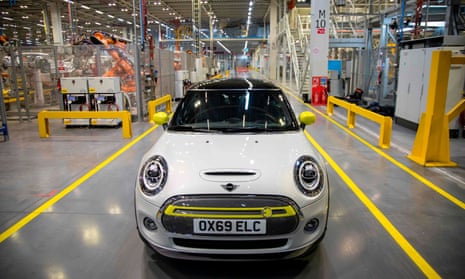
Brexit: German carmakers join calls for changes to trade deal
Move follows plea from Ford, Vauxhall owner and JLR to avoid 10% price rise on electric cars
Germany’s powerful automotive industry has joined calls for an extension of a Brexit trade deadline for three years to avoid a 10% price rise on electric vehicles that cross the Channel to the UK.
The Brexit trade deal struck between the UK and EU at the end of 2020 contained “rules of origin” intended to spur the creation of domestic electric car battery industries to ensure the region does not remain dependent on Asian battery imports. However, new factories have not sprung up quickly enough, meaning some carmakers may face the prospect of tariffs on exports in January.
The VDA, the German car industry lobby group, said “it is now urgent to adjust” the deal because tariffs would represent “a significant competitive disadvantage for the European car industry in relation to its Asian competitors in the so important UK market”. Tariffs would slow down the shift to electric cars, it argued.
The VDA’s members include some of the world’s most powerful carmakers such as BMW, Mercedes-Benz, Porsche and Volkswagen. The UK represents an important and profitable market for Germany’s carmakers – albeit a small part of their global sales.
Carmakers have had two years to prepare for the deadline, but the flurry of lobbying was triggered by Stellantis, the owner of brands including Vauxhall, Fiat and Peugeot, telling a UK parliamentary committee that it needed more time to source batteries from within Europe.
Ford, Jaguar Land Rover and the European Automobile Manufacturers’ Association on Wednesday joined Stellantis in publicly calling for the deadline to be extended.
Under the rules all cars exported from the UK to EU or vice versa must source 40% of their parts by value from within countries within the trade deal. However, that proportion is due to rise on 1 January to 45%, and in 2027 it will rise to 55%.
As most electric vehicle batteries are still imported from China, South Korea and Japan, and batteries make up a large part of the cost of building a car, vehicles made in the UK and the EU are likely to fall foul of the rules.
The VDA asked for the deadline to be extended until the end of 2026.
after newsletter promotion
Mike Hawes, the chief executive of the Society of Motor Manufacturers and Traders, a British automotive lobby group, said: “The UK-EU trade and cooperation agreement provided the basis for tariff-free trade and unlocked some pent-up investment.
“However, the rules of origin for batteries pose a significant challenge to manufacturers on both sides of the Channel, with the prospect of tariffs and price increases which discourage consumers from buying the very vehicles needed to achieve climate change goals.
“At a time when every country is accelerating their transition to zero emission transport, and global competitors are offering billions to attract investment in their industries, a pragmatic solution must be found quickly.”